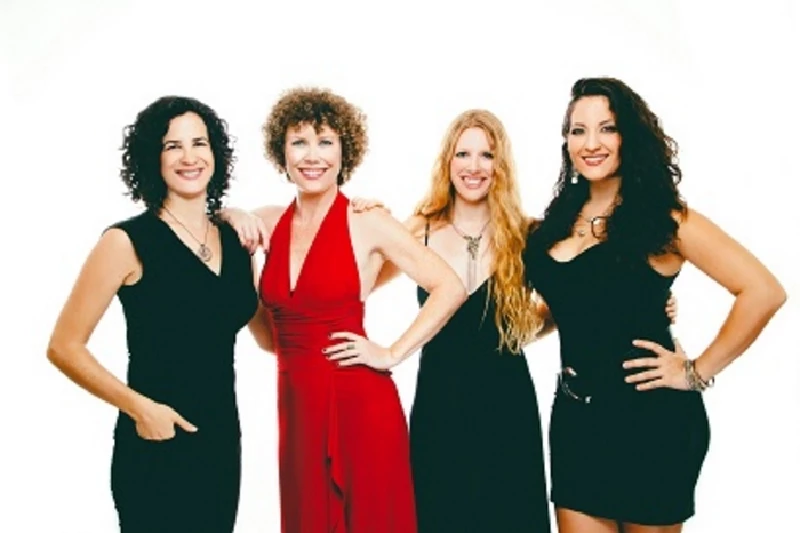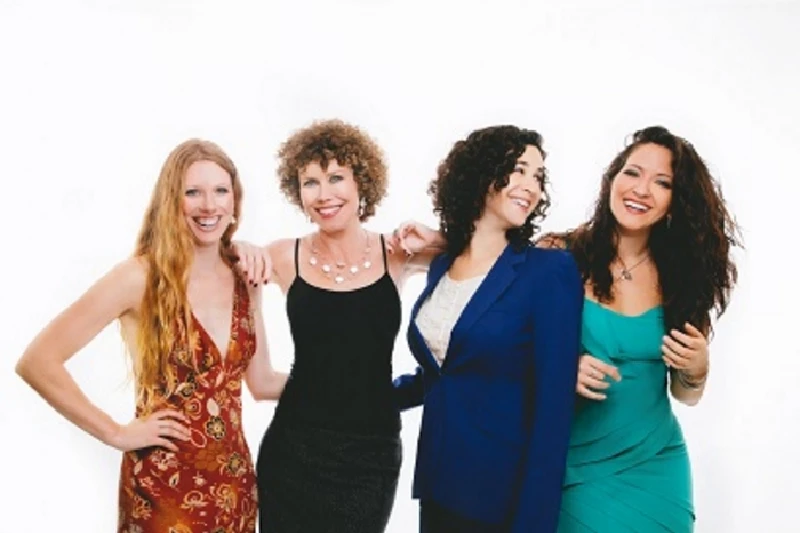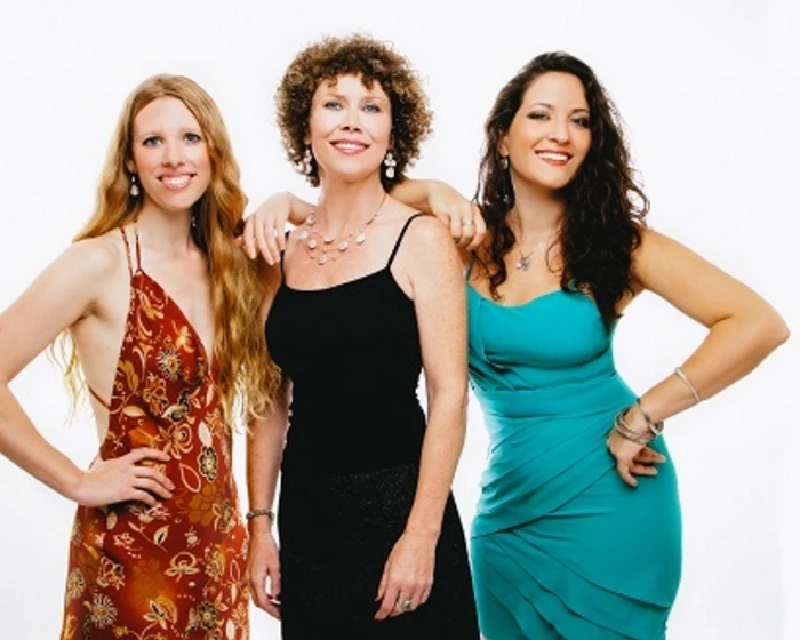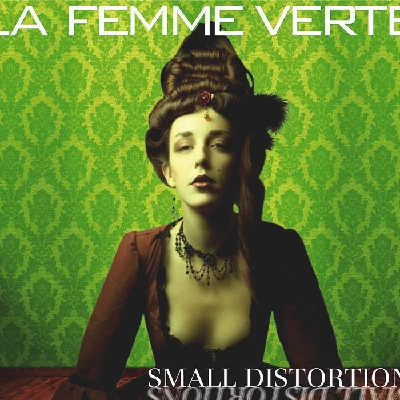La Femme Verte - Interview
by Lisa Torem
published: 14 / 12 / 2013

intro
Lisa Torem speaks to folk act the Jammin’ Divas about their music, and, with its members living in three different countries, their unorthodox approach to songwriting
Coming from almost all corners of the world, the Jammin’ Divas combine vibrant three-part harmonies, old world instruments, traditional roots music and contemporary originals to perform in concert halls all across the globe. Committed to retelling the tales of their ancestors, their repertoire includes songs drawn from literature and passed down by family members – Aoife Clancy, Grammy nominee of Cherish The Ladies, is the daughter of Bobby Clancy, of the world-acclaimed Clancy Brothers. Aoife continues her family tradition by performing with other relatives in a popular Clancy Family Tribute as well. Three members of the quartet, Kath Buckell, Nicole Zuraitis and Aoife Clancy. talk about the band’s beginnings, many influences and unique songwriting approach. PB: Aoife Clancy is from Ireland, Nicole Zuraitis and Craig Akin are from the US, Hadan Noiberg is from Israel and you, Kath Buckell, are from Australia. How did you meet, what made you decide to form a band and how have your cultural backgrounds informed your material? KB: This is a very unique story and one that took us to many different countries/states to find one another. I first met Aoife in Israel about eight years ago, I was living there for three years. We were both performing in different groups at this beautiful festival up north called the Jacobs Ladder Festival. Aoife was headlining, and I was performing with my band. During the festival, we had a private musicians' song circle where a small group of musicians got together. Aoife and I were amongst them, and we shared songs and really had a strong musical connection. So she said, "If you are ever in the US please look me up," and so I did. About three years later, I left Israel and came to visit the US for three months. This is where I met Hadar Noiberg, our musical director and flutist. Aoife knew our former American band mate Becky Chace in MA at a bar that she used to frequent, and really connected to her voice. We had the opportunity to all meet and perform together spontaneously at a place called The Kinsale Inn in Mattepoisette, MA. I was supposed to open for an Australian group Women in Docs though, unfortunately, they couldn't make the show, so we had a full house and no band! The promoter asked Aoife. “Would you like to do something with Kath and Hadar?” and Aoife agreed and also added, “What if I ask Becky as well?” So, we had a two-hour rehearsal and ran through each other’s material, found some harmonies that worked and the show went on. We also needed to think of a name really quickly so Aoife said jokingly, "Well, we are jammin' and we are all divas in our own right. How about we call ourselves for this show “The Jammin' Divas?” Because we had no time to think about it we said, “Sure why not? It has a ring to it” and it has stuck ever since. From that night we had a magical connection, and later we added double bass with a dear friend Craig who I had met in New York City. Nicole Zuraitis is our new American member. She has replaced our dear friend Becky Chace. I met her about three years ago and we became really close friends, so we asked her if she would be interested in filling the large shoes of Becky Chace and she was honored and excited to join the band. She is a phenomenal vocalist and pianist, and has definitely added a lot to the sound of the group. PB: What are your musical backgrounds? KB: I grew up on a lot of different kinds of music from an early age. My parents were very musically explorative and had many records from Classical, World and 70's, 80's rock and pop. The artists that had influenced me incredibly growing up would have to be: Van Morrison, Eric Clapton, Bonnie Raitt, Eva Cassidy, Renne Geyer, John Farnham, Joni Mitchell, Joan Baez and the beautiful Judy Collins. So I was very much influenced by American music early on. AC: I grew up in a family steeped in music. My father was Bobby Clancy of the Clancy Brothers, so I grew up in a house steeped in music from an early age. He taught me banjo and guitar when I was younger, and he used to bring me to singing sessions in country pubs where he would perform and recite poetry. My father was my main influence growing up. He would teach me traditional Irish and American folk ballads. Then he would bring home records of Odetta, Nancy Griffith and the McGarrigle Sisters. He taught me how to be in front of an audience and he would always say to me when I would feel fear - as I was quite shy as a youngster - "Always enjoy singing, remember to sing from the heart and it will come across that way to your audience so you have nothing to fear." NZ: I grew up listening to the classic jazz greats like Ella Fitzgerald, Nat King Cole, but I am also heavily influenced by Led Zeppelin, Billy Joel, Carol King, Stevie Wonder and the Smashing Pumpkins. I studied opera at NYU when I was in college, and then went onto to perform more jazz, pop and soul music across the northeast region of the US. I found out at around the age of twenty-three that I had a connection to songwriting and that's when I fused all of my influences together. PB: There are two songs, both beautiful, but which sound unfamiliar to my American ears. Can you tell me more about 'I Span and Eve Span' and 'Deise Day'? KB: ‘I Span and Eve Span’ was originally just a poem without any music. It was written by one of my favourite poets in Australia, Dame Mary Gilmore. She was an iconic writer from 1865 to 1962. With the Jammin' Divas I wanted to introduce some of the traditional Australian poetry put to original music that I composed, and give the audience a reflection of Australia during this period of time. I chose three poets: Henry Lawson, Dame Mary Gilmore and Andrew Barton Patterson (‘Waltzing Matilda’). This particular poem if I were to interpret it, is about a woman who longs for her husband’s support and love for her and the children at home. He was a sheep shearer and in those days, and still to this day, worked extremely long hours in what we could say are an incredibly arduous and tough occupation that requires immense physical labor. This was a crucial period of time for Australia as it was forming its identity as a nation, and wool was a major commodity and high income for the family. I used a specific rhythm and mood for this song to reflect the old spinning wheels. Also the word 'span' is just another term for spinning. AC: ‘Deise Day’ is a song written by my brother-in-law Ryland Teifi. It is about the area called Ring in County Waterford where my mother grew up. My aunt has a pub there, where it is an Irish-speaking area and there is a lot of traditional Irish music and singing. “The Deisi” is the old name for that area. It is loosely based on my father going over to the United States in the 50s and performing over there with the Clancy Brothers, which are his brothers and then coming back to my aunt’s pub and it speaks of the intimate sessions they used to have there. PB: Is the song 'Issue' autobiographical? It sounds like at least one of you had a rebellious youth? KB: Becky Chace, our former American member on our first record, wrote ‘Issue’. She wrote it because at an early age she knew she wanted to be a professional singer, and she had to confront her parents with this idea. So her parents’ response was very supportive, but "just don't drink and drive". That was a reference to one of her lyrics in her song. She was fortunate that her parents understood her passion and drive to be a professional singer ,and that she had an incredible talent. Becky grew up on country music as well, so this song was very fitting as we all connected to the country/bluegrass sound. PB: When performing a traditional song like 'Sleeping Maggie', what is most important about the musical arrangement? KB: The most important thing is that the music reflects the imagery that is being exemplified in the lyric. That is why we love a lot of traditional music whether it is complicated jig or a slow ballad - there is always a direct relationship between the music and the roots of it's culture. PB: How is the recording of your second album going and what should we expect to hear? KB: We will be going into the studio to record our second album in New York on the 17th of December. We will be bringing together original songs from Nicole and myself, plus some traditional songs from Ireland, Australia and the US. Aoife is a great interpreter of songs written by artists that she respects and also some traditional ballads that her father taught her growing up. Hadar and Nicole have done a fantastic job arranging the songs, so that even though we each share the lead vocal we combine it with rich harmonies that make it blend beautifully. PB: You tell stories during your live performances. Which ones have meant the most to you and your audiences? KB: We have found that the stories that lead into a song are usually the most touching. Each song has been carefully selected by all three of us, and holds a lot of memories from where we each are from. For instance, on the new record we will be recording ‘The Band Played Waltzing Matilda’ by Eric Bogle, an iconic Australian songwriter who wrote this back in 1971. It is about the Australian New Zealand Army Corps (ANZACS) that were on the front lines in Gallipoli. Aoife's uncle, Liam Clancy, really popularized this song internationally after singing an amazing rendition. So we tie in the connection between Australia and Ireland not only culturally but by personal experiences as well. PB: Who are the songwriters and how does that process work? KB: Nicole and I write original songs, and interpret some covers that are traditionally based from the US and Australia. Aoife is a great interpreter of music that she has either grown up on or artists that she really respects and admires within her culture, such as Maira O'Connell. We all listen to each other’s choices, and find which ones work best for the sound of the group. Usually we are pretty spot on with our selections as we are very familiar with what each other's taste in music is. Then the magic happens with our musical director Hadar Noiberg, She basically pulls the songs apart, re-arranges them and puts them back together again, creating lovely three-part harmonies and solo sections for her and the bassist. We also love to showcase her and Craig, our double bassist, as they are both accomplished jazz musicians, as well, so we have a section where we give them space to improvise. PB: 'Orphaned by The Color of My Skin' is about the plight of native Australians. What inspired the theme? KB: While I was in Israel I observed from the people in both the Muslim and Jewish cultures the deep connection to traditions and roots to the landscape and people. I then questioned more about what types of traditions we have in Australia ,and I found a deep connection to understand more about the indigenous Australians and what they had endured since early colonialism, I also found it in the traditional poetry. I found an incredible book that was written by a woman who went through the stolen generation, Mary Terzak. I actually had the chance to meet with her in Melbourne this summer and she shared her whole story of how she was taken away from her mother, never knew her father and what her experiences were living in the mission camps. I was speechless. This woman had endured so much, and as an Australian of European descent I had not really heard these experiences to the degree that she had told me about, when growing up. Her book was titled 'Orphaned by the Colour of My Skin'. Before I had the chance to meet her I actually wrote this song and had been performing it within the USA. She found an interview of mine online. and made the connection that it was about her. I really feel compelled to share her story as she is a living example of the importance of people having the freedom to express their cultural traditions, and the importance of family and connection to the landscape of where they're from. PB: You discuss performing songs drawn from poetry. The original poem, 'Ballad of the Drover' by henry Lawson was quite extensive and loaded with imagery. How did you edit the text and make it musical? KB: I first read the poetry out loud to hear the rhythm in the poetry, and then I could get a grasp of what kinds of musical themes I would like to connect with the lyric. As a folk singer, the story really needed to be heard and the music was just a bed for the lyrics to lie in, complementing the imagery. I wanted this song to reflect the drover walking as they travelled incredible lengths herding cattle within Australia, and could be away from home for up to two years at a time. I found that once I wrote the music I needed to edit some of the text in order to complement my melodic phrasing. Because a lot of poetry, especially traditional poems, have a lot of words, sometimes when it is sung not every word is heard and therefore I needed to trim them up a bit without taking away from the essence of the language. It is an English that we don't hear very often, so well constructed and eloquent. I felt the music just pours out of the lyric, it is very easy for me to hear the music when I read a very clear theme and well constructed story. PB: Aoife began performing with her father Bobby at fourteen. The Clancy Brothers are legendary for popularising traditional Irish music in the US. Has the group influenced your choice of material? Are there any trad or contemporary groups that you all agree contribute to your sound? Finally, what do you hope the legacy of the Divas will be? AC: I feel that my father Bobby Clancy had influenced my choice of material for the band to a certain degree. Some of the material we do in the band are songs that he had taught me growing up such as ‘Galway City’ and ‘Beggarman.’ We deliberately wanted to change the arrangements of these songs so they are not the same as the original version and to contemporise them. The traditional songs are great because they are very easy to interpret in a different style, and even though the girls don't come from the same cultural tradition as I we are able to find a common blend. Originally we weren't really listening to any harmony groups, because when we first got together it was by chance and we thought, well, we should include harmonies to see how our voices will blend together for the first show that we did. When we decided to really form the band and develop our sound, we brought Hadar into the picture and she created such stunning harmonies that it then became an integral part of the group. Along the way we have been listening to many harmony groups, and have been influenced by Wailing Jenny's, Clancy Brothers, Red Molly and the High Kings. We also love the blend and sound of traditional bluegrass. We hope the legacy of the Divas will be to inspire other up and coming musicians to culturally explore and be open to learning more about the roots of traditional music. And, hopefully, that will encourage them to bring their own experiences into the music. As for the lyrics, we feel that this is an important element not to be lost in the younger generations. We are noticing that a lot of the kids are using more short hand with all of this new technology that is around. We would love for them to explore more poetry and the roots of their language to help with finding new ways of expressing themselves as well on a deeper level. PB: Speaking of self-expression, the Jammin' Divas conduct songwriting workshops on tour. What is the focus? KB: We focus on giving our students an understanding of the cultural background of the folk music from Australia, Ireland and the USA. We incorporate examples of the history of this music through demonstrating different songs that reflect stories from each prospective culture. We love for our workshops to be interactive, so we have some of the students come up and improvise with us and also they learn traditional Irish dance step from Aoife while the band plays behind them. PB: You just got news that your next album has been funded. How will you celebrate? KB: We are so grateful for all the support we got from our fans, family and friends. We will be celebrating by recording our new CD in December, and then supporting the release of the CD with a tour of Australia, USA, Israel, Canada and possibly Ireland. PB: Thank you.
Have a Listen:-
Picture Gallery:-


reviews |
|
Small Distortions (2011) |

|
| Eclectic and captivating collection of cover versions of familiar tunes which have been been remarkably overhauled by La Femme Verte, which includes Julianne Regan and Gene Loves Jezebel's Jay Aston |
most viewed articles
current edition
Carl Ewens - David Bowie 1964 to 1982 On Track: Every Album, Every SongArmory Show - Interview with Richard Jobson
Colin Blunstone - Thalia Hall, Chicago, 16/7/2025
Visor Fest - Valencia, Spain, 26/9/2025...27/9/2025
Bathers - Photoscapes 1
John McKay - Interview
Robert Forster - Interview
Billie Eilish - O2 Arena, London, 10/7/2025
Sir Tim Rice - Interview
Loft - Interview
previous editions
Heavenly - P.U.N.K. Girl EPManic Street Preachers - (Gig of a Lifetime) Millennium Stadium, Cardiff, December 1999
Beautiful South - Ten Songs That Made Me Love...
Oasis - Oasis, Earl's Court, London, 1995
Pixies - Ten Songs That Made Me Love...
Trudie Myerscough-Harris - Interview
Prolapse - Interview
Doris Brendel - Interview
Simon Heavisides - Destiny Stopped Screaming: The Life and Times of Adrian Borland
Paul Clerehugh - Interview
most viewed reviews
current edition
Sick Man of Europe - The Sick Man of EuropeLucy Spraggan - Other Sides of the Moon
Amy Macdonald - Is This What You've Been Waiting For?
Phew, Erika Kobayashi,, Dieter Moebius - Radium Girls
Davey Woodward - Mumbo in the Jumbo
Bush - I Beat Loneliness
Blueboy - 2
Alice Cooper - The Revenge of Alice Cooper
Cynthia Erivo - I Forgive You
Suzanne Vega - Flying With Angels
Pennyblackmusic Regular Contributors
Adrian Janes
Amanda J. Window
Andrew Twambley
Anthony Dhanendran
Benjamin Howarth
Cila Warncke
Daniel Cressey
Darren Aston
Dastardly
Dave Goodwin
Denzil Watson
Dominic B. Simpson
Eoghan Lyng
Fiona Hutchings
Harry Sherriff
Helen Tipping
Jamie Rowland
John Clarkson
Julie Cruickshank
Kimberly Bright
Lisa Torem
Maarten Schiethart